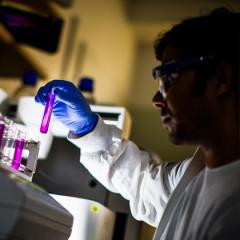Researchers from the University of Queensland’s Australian Institute for Bioengineering and Nanotechnology are calling for global benchmarking to fast-track PFAS research and remediation efforts.
 PFAS – or per- and poly-fluoroalkyl substances, also known as ‘forever chemicals’ – is the umbrella term used to describe the thousands of man-made chemicals used in everyday products, from clothing and non-stick cookware to food packaging.
PFAS – or per- and poly-fluoroalkyl substances, also known as ‘forever chemicals’ – is the umbrella term used to describe the thousands of man-made chemicals used in everyday products, from clothing and non-stick cookware to food packaging.
Their resistance to oil, water, stains and heat has made them essential in industries like retail and aerospace, but the bonds that make PFAS so durable also make them extremely difficult to break down, leading to growing environmental and health concerns.
AIBN researcher Dr Cheng Zhang said PFAS contamination is a critical global issue, with high levels detected in groundwater, drinking water, landfill leachate, soils, biosolids, and even in the organs of wildlife and humans.
“PFAS is everywhere – it’s in the air, our animals, our clothes, and our bodies – and we still don’t fully understand the long-term impacts,” Dr Zhang said.
“Like microplastics, PFAS spreads easily and is incredibly difficult to contain, which is why we need urgent solutions before this issue gets beyond our control.”
In Australia, the National Health and Medical Research Council (NHMRC) is working to update national PFAS guidelines around drinking water, a step Dr Zhang acknowledges as an important step forward.
“It’s great to see governments and industries taking action to phase out the use of PFAS, but in some industries, comparable alternatives don’t yet exist – so their use continues,” he said.
Join The Network
Stay on top of our industry news and developments, events and opportunities, by joining The Network
“We’ve developed world-first technology using a specialised sorbent to remove PFAS from groundwater and leachate,” he said.
“But without benchmark data, it is very difficult to compare its performance against other studies.
“That’s why we’re urging the research community to adopt global standards – so we can refine and scale up this critical technology.”
Over the next 12 months, Dr Zhang’s team will take part of their ground-breaking research from the lab bench to real-world applications, testing their patented sorbent-based filtration system on wastewater and leachate found in South East Queensland waterways and landfills.
“Solving the issue of PFAS requires a multi-pronged approach which is why we’re creating different scalable solutions that can be used anywhere PFAS exists,” Dr Zhang said.
“One of our techniques uses a membrane we’ve developed, together with a filter, to isolate and remove PFAS particles as water passes through it.
“If our testing phase is successful, we’ll be able to deliver a world-first PFAS remediation technology that efficiently removes PFAS from challenging contamination environments, offering a scalable and sustainable solution for real-world applications."
“Our project is about more than research – it’s about finding solutions that directly address some of the world’s most pressing environmental challenges.”
Dr Zhang is joined by AIBN's Dr Zicheng Su on the project that is backed by $1 million from the Advance Queensland Industry Research Projects program and supported by industry partners GHD and OCTA.
Want to learn more about this story or how you can partner with AIBN on ground-breaking research?
Contact us via email: communications@aibn.uq.edu.au
or phone: +61 414 984 324


